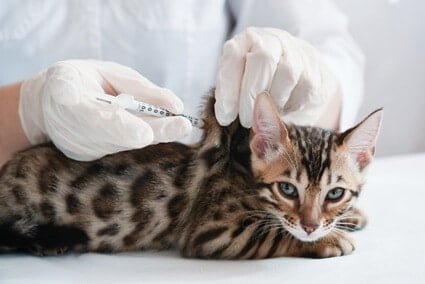Do Indoor Cats Need Vaccines Every Year
Do indoor cats need vaccines every year? Some people believe that they do and others do not. Cats have been shown to be healthy and intelligent when they are vaccinated against some of the most common diseases, but there is still some debate over whether or not they need all of the vaccines every year.

Indoor cats need vaccines every year, but it's important to know the types of vaccines and when they're best to give them.
Every year, many cats get vaccines to help them stay healthy and protect themselves from some of the most common diseases. However, it's important to know which types of vaccines are best for your cat and when to give them. Here are five tips on how to choose the right vaccine for your feline friend:
1) Check with your veterinarian first if your cat has any specific allergies or health concerns that might make him ineligible for a particular vaccine.
2) Know which diseases are most commonly contracted by cats and get vaccinated against them as soon as possible. This will help keep your pet safe from developing long-term health problems.
3) Make sure you give each of your cats a full course of three different vaccines at least once a year, depending on their age and weight.
The Types of Vaccines: There are three main types of vaccines that indoor cats need: rabies, distemper, and Lyme.
Are indoor cats required to receive vaccines every year? There are three main types of vaccines that indoor cats need: rabies, distemper, and Lyme. The benefits of receiving these vaccines are that they can help protect your cat from diseases, and can also help prevent them from getting sick. If you’re not sure if your cat needs a vaccine, ask him or her about it; there’s no need to wait until they get sick.
When to Give a Vaccine: Generally speaking, you should give a vaccine as soon as possible after your cat contracts a disease. However, there are exceptions, such as for distemper when there is a high risk of spreading the disease to other animals or when the sick cat is exhibiting symptoms that could indicate another virus.
Generally speaking, you should give a vaccine as soon as possible after your cat contracts a disease. However, there are exceptions. For example, certain types of vaccines may not be given to cats when they are sick.
Rabies: Rabies is a deadly virus that can attack any animal, including humans. If your cat
Rabies is a serious virus that can attack any animal, including humans. If you have your cat vaccinated every year, they may not be at risk for rabies, but if you don't vaccinate them, they may become infected with the virus and potentially die from it. Rabies is a preventable disease and it's important to get your cat vaccinated.